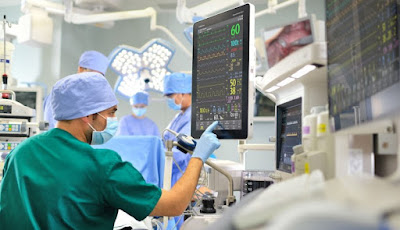10 importance of technology in healthcare
 |
| 10 importance of technology in healthcare |
Technology has become an integral part of healthcare, significantly enhancing various aspects of the industry. Here are ten key points that underscore the importance of technology in healthcare:Follow for more ineresting blogs visit All Worlds WideAll Worlds Wide
1.Improved Diagnostics and Early Detection
Technological advancements, particularly in imaging and data analysis, have significantly improved the accuracy and speed of diagnostics. Advanced imaging technologies like MRI, CT scans, and PET scans provide detailed insights into the human body, enabling early detection of diseases. For instance, AI-powered diagnostic tools can analyze medical images to detect conditions like cancer or heart disease at an early stage, which is crucial for successful treatment
2. Enhanced Patient Care and Treatment
Technology has revolutionized patient care by providing more precise and personalized treatments. Electronic Health Records (EHRs) allow healthcare providers to access a patient’s medical history instantly, facilitating better coordination and decision-making. Personalized medicine, driven by genomics and big data, tailors treatments to individual genetic profiles, improving efficacy and reducing side effects.
3.Increased Accessibility to Healthcare Services
Telemedicine has made healthcare more accessible, especially for people in remote or underserved areas. Virtual consultations enable patients to receive medical advice without the need to travel, reducing barriers to care. This has been particularly beneficial during the COVID-19 pandemic, where in-person visits were limited.
4. Efficient Management of Chronic Diseases
Wearable devices and remote monitoring technologies have transformed the management of chronic diseases like diabetes, hypertension, and heart disease. These devices track vital signs and health metrics in real-time, sending data to healthcare providers. Continuous monitoring allows for timely interventions and better disease management, improving patient outcomes and quality of life.
5.Enhanced Medical Research and Drug Development
Technology plays a pivotal role in medical research and the development of new drugs. Computational biology and AI-driven research tools accelerate the discovery of new treatments and the understanding of complex diseases. Big data analytics can identify patterns and correlations in vast datasets, leading to breakthroughs in areas like cancer research and personalized medicine.
6.Operational Efficiency in Healthcare Facilities
Automation and information technology have streamlined operations in healthcare facilities, improving efficiency and reducing costs. Hospital management systems handle patient admissions, scheduling, and billing, reducing administrative burdens on staff. Robotics and automated systems in laboratories and pharmacies enhance accuracy and speed in tasks like sample analysis and medication dispensing.
7.Improved Patient Education and Engagement
Technology has empowered patients by providing them with access to information and tools to manage their health. Patient portals and mobile apps allow individuals to access their health records, track their progress, and communicate with their healthcare providers. Educational resources and interactive tools help patients understand their conditions and treatment options, leading to better engagement and adherence to medical advice.
8.Enhanced Surgical Precision and Outcomes
Robotic surgery and minimally invasive techniques have significantly improved surgical outcomes. Surgical robots provide enhanced precision, flexibility, and control, allowing surgeons to perform complex procedures with greater accuracy. These advancements reduce the risk of complications, shorten recovery times, and improve overall patient outcomes.
9.Better Data Management and Securit
The digitization of health records and the use of blockchain technology have improved data management and security in healthcare. EHRs ensure that patient information is readily available and easily shareable among authorized healthcare providers, enhancing continuity of care. Blockchain technology provides a secure and transparent method for managing health data, reducing the risk of breaches and ensuring patient privacy.
10.Cost Reduction and Resource Optimization
Technology has the potential to reduce healthcare costs and optimize the use of resources. Predictive analytics can forecast patient admissions, enabling better resource allocation and staffing. Telemedicine and remote monitoring reduce the need for hospital visits, lowering healthcare costs for patients and providers. Automation of administrative tasks and the use of AI in diagnostics and treatment planning can also lead to significant cost savings.
Conclusion
Technology is fundamentally reshaping the healthcare industry, driving improvements in diagnostics, patient care, and operational efficiency. The integration of advanced technologies like AI, telemedicine, wearable devices, and robotics is making healthcare more accessible, personalized, and effective. These advancements are not only enhancing the quality of care but also ensuring better health outcomes and more efficient use of resources. As technology continues to evolve, its impact on healthcare will only grow, paving the way for a more advanced, patient-centered, and cost-effective healthcare system.






0 Comments